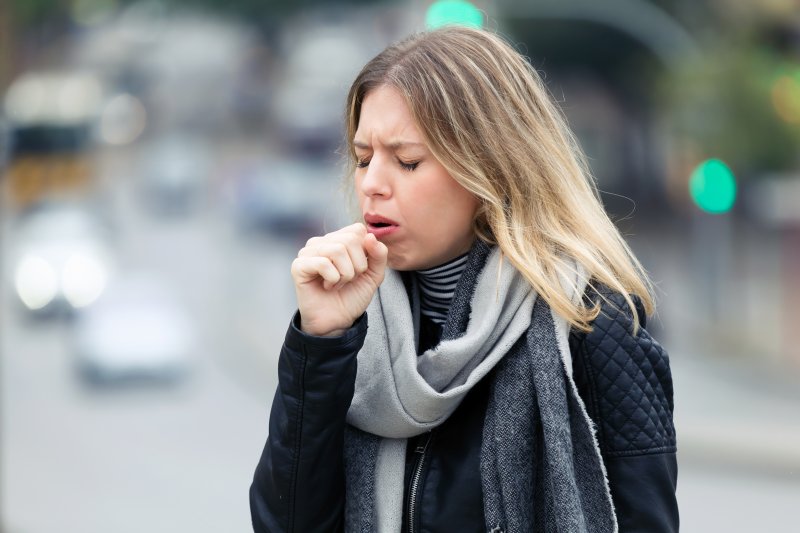
Many of the symptoms of COVID-19 are similar to an ordinary flu; this includes fever, tiredness, and a dry cough. As troublesome as these issues can be on their own, you need to be aware of the hidden impact they could be having on specific parts of your body. In particular, the frequent coughing associated with COVID-19 and similar illnesses has been linked to a variety of oral health issues. Read on to learn about the damage your sickness could be doing to your smile – as well as ways you can control it.
How Can COVID-19 Affect My Oral Health?
When an illness such as COVID-19 causes you to cough a lot, your mouth tends to dry out, which irritates the teeth and the gum tissue. In other words, you could start noticing various oral aches and pains. A dry mouth can also lead to plaque buildup in your mouth since there is less saliva to wash away plaque and other harmful substances.
The medicine you take for a cough could also cause unintended damage to your smile. Many cough syrups use sugar as an ingredient to mask their generally unpleasant taste. As sweet as the sugar can be, it can still lead to cavities once oral bacteria feed on it and release acid as a byproduct. Furthermore, certain cough medicines contain small amounts of alcohol, which could contribute to a dry mouth – thus making an already existing oral health risk even worse.
What Can You Do to Protect Your Mouth?
In order to keep your smile safe while also treating your symptoms, try following these steps should you become sick due to COVID-19 or a similar illness:
- Drink plenty of water. This will help combat the effects of coughing and any medication you might be taking that could dry out your mouth.
- Take pills instead of liquid medicine. A pill won’t stay in contact with your teeth and gums for very long; in contrast, cough syrup will essentially cover the mouth with food and alcohol.
- Plan to take your cold medication during meals. Your mouth produces more saliva when you eat, and that will help quickly wash away the sugar and other harmful ingredients.
- Practice good oral hygiene. Brush immediately after taking your medication; this is especially important before bed, since the last thing you want to do is leave alcohol and sugar on your teeth all night.
Ideally, by using common sense and good hygiene practices, you’ll avoid illness altogether. But in the event that you do become sick, it’s important not to let your oral health fall to the wayside just because you don’t feel well. If you have any concerns about your teeth in the midst of your sickness, contact your dentist for advice.
About the Author
Dr. Jeff Lee attended dental school at The Ohio State University College of Dentistry. He has also completed a four-year residency in Oral and Maxillofacial Surgery, and in the past he has participated in numerous research projects. His Cambridge practice, Muskingum Valley Oral Surgery, currently remains open to perform emergency teeth extractions. You can get in touch with Dr. Lee by visiting his website or calling (740) 432-8768.
